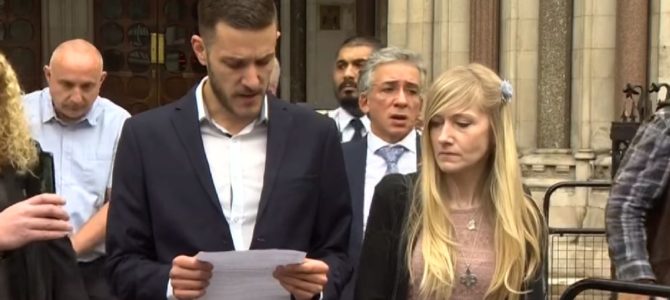
A sorry and shameful saga has come to a close in London, where the parents of gravely ill infant Charlie Gard have decided not to seek a last-ditch treatment that might have saved his life. The entire ordeal —which has provided a crystalline example of the literally life-threatening dangers of overlarge government—should be the shame of the United Kingdom and a warning to the rest of the world. That it will very likely function as neither is a modern-day political and civilizational tragedy.
Charlie Gard is a dying baby with an incredibly rare disease, one which has no known cure yet. His parents, desiring as most parents do to grant their child life rather than deny him it, wished to take him to the United States for a long-shot experimental treatment. They raised all the necessary funds to do so, and they would have done so—had not the hospital treating Charlie prevented this by way of the British courts.
The hospital, and the courts, won—not because Charlie is dead (at the time of this writing he is still alive) but because, by denying Charlie’s parents the right to seek treatment in the United States then wasting time through a protracted legal process, the defendants in the case effectively ran out the clock on Charlie, in the same way a professional football team will run out the clock at the end of the fourth quarter.
Death at the Hands of Well-Educated Barbarians
The courts and hospital staff doubtlessly knew there was only a small window of opportunity for Charlie to seek the medical treatment he needed to save his life. All they had to do was wait for Charlie’s condition to worsen past the point of absolute no return and they would get their way. So they did. “There is one simple reason for Charlie’s muscles deteriorating to the extent they are in now – time. A whole lot of wasted time,” Charlie’s mother said in a statement. “Our poor boy has been left there to lie in a hospital without treatment while court battles are fought.”
He was, and so he will die. And it is a most curious indicator of twenty-first-century Western political mores that the entire civilized world is not up in arms—figuratively if not literally—over the British government’s effective war of attrition against a terminally ill baby boy.
If we were to hear of some barbarous backwater dictatorship that prevented a couple of desperate parents from seeking medical treatment abroad for their precious child, we would shake our heads and marvel such savage cruelty. When such nauseating policy is argued by barristers and educated medical professionals, however, we are likely to forget about it within a couple of weeks.
We Should Not Forget Charlie Gard
We should not forget about this. The lessons of Charlie Gard should not be ignored or dismissed. Parents in particular should be aware of the implications of what the British government has undertaken here. When progressives in America look to Western Europe as a political model for the United States, they have in mind—inadvertently or otherwise—the kind of government you see in England, the type that supplants the love and the desire of parents to save their children’s lives with the cold, actuarial number-crunching assessments of judges and doctors.
In the film “I, Robot,” the protagonist Del Spooner at one point admits that his distrust of robots stems in part from their inability to assess a situation as anything other than a matter of clinical statistics. Years before, during a car accident emergency, a robot opted to save Spooner’s life rather than a little girl’s because Spooner’s “chance of survival” was 43 percent compared to the girl’s 11 percent. Spooner understands: “That was somebody’s baby. Eleven percent is more than enough. A human being would have known that.”
England is governed by human beings, of course, not robots, yet it is curious how coldly, mercilessly robotic the mechanistic undertakings of big government end up being. A compassionate system, in Gard’s case, would have offered the parents all the information and the caveats it possibly could, then allowed them to make their own choices concerning their precious baby’s life. Big government cannot abide by such nuance, however. It seeks control above everything else, even if not especially in the most difficult and fraught of situations.
The only thing anyone can do for Charlie Gard now is pray. But that wasn’t always the case. A few months ago there was a slim but still distinct possibility that his life could have been saved. The British government denied him that chance. Remember this, and the next time one of your progressive friends laments that our government is not more like that of England, tell them the honest truth: “Thank God.”









